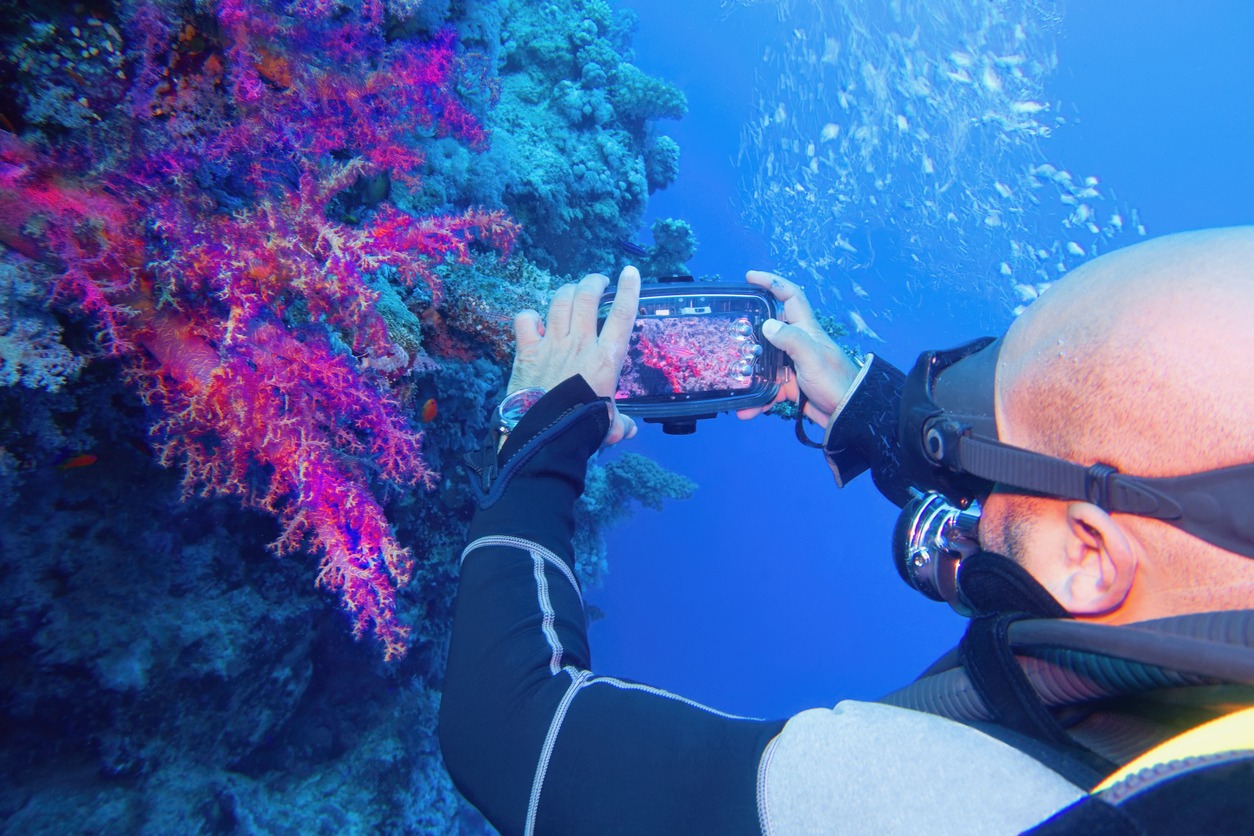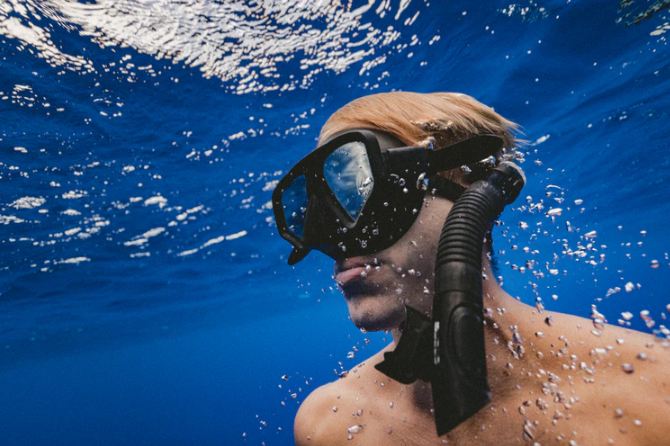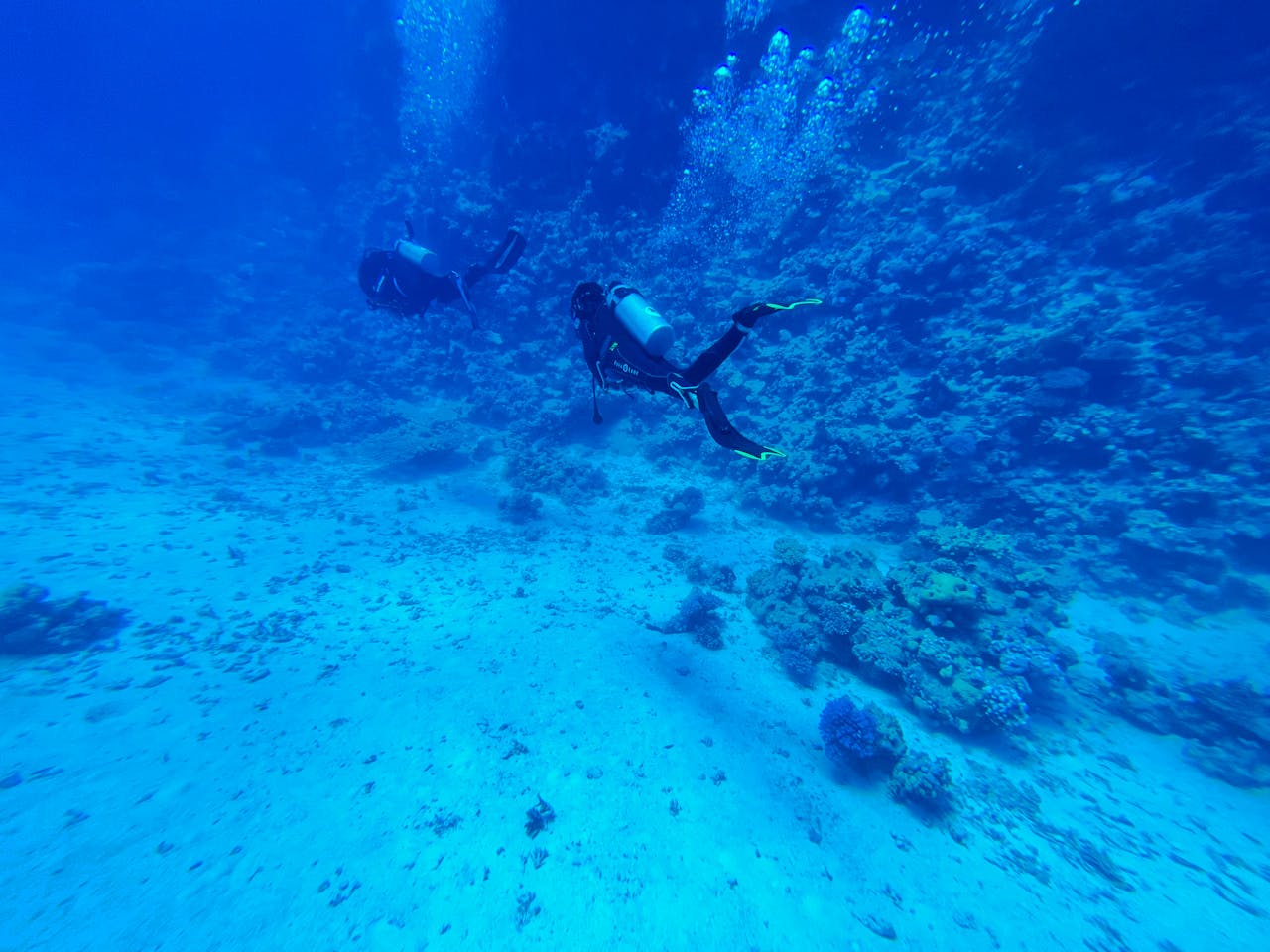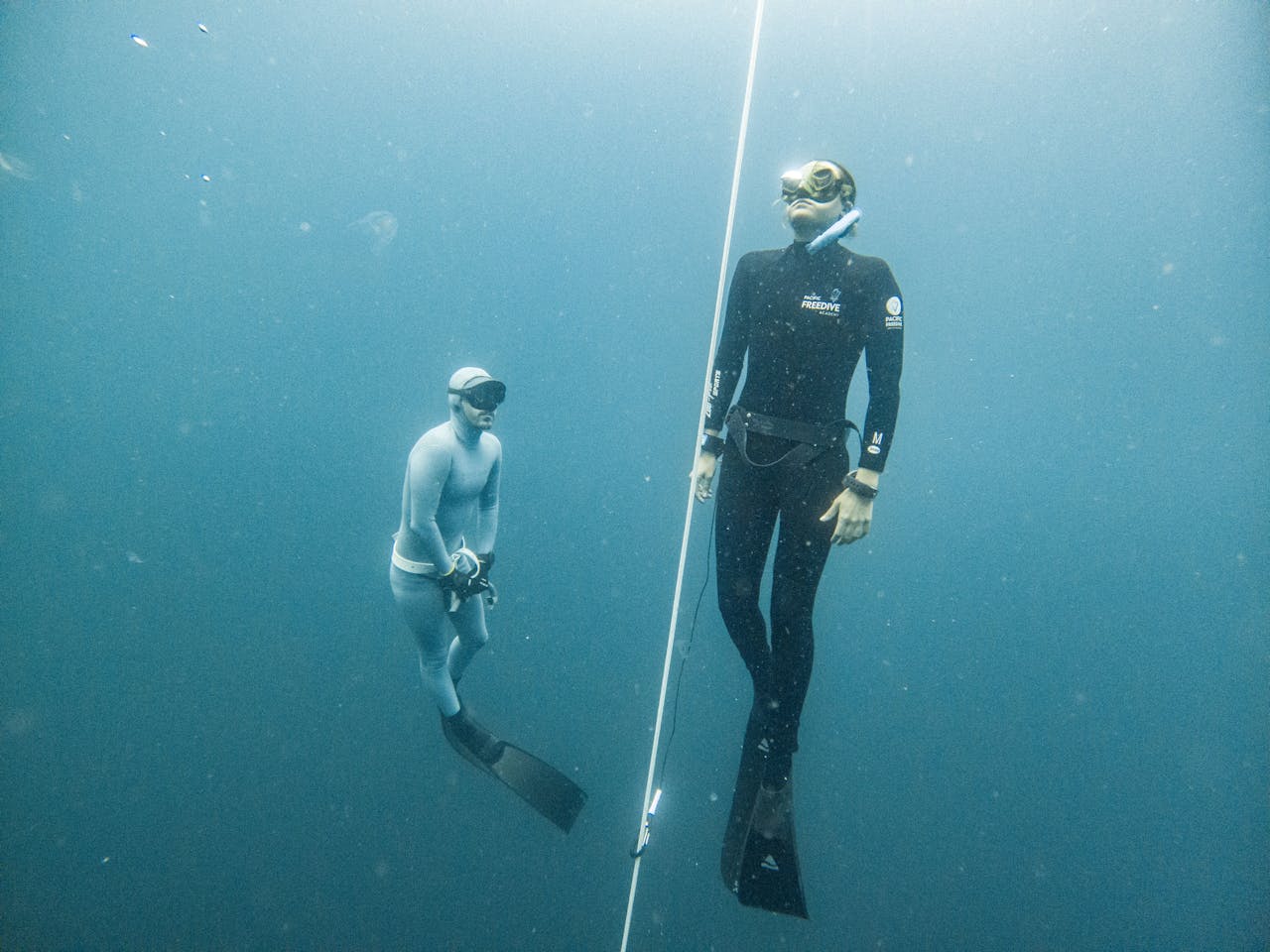Guide to Snorkeling in Greece: Top Sites and Tips
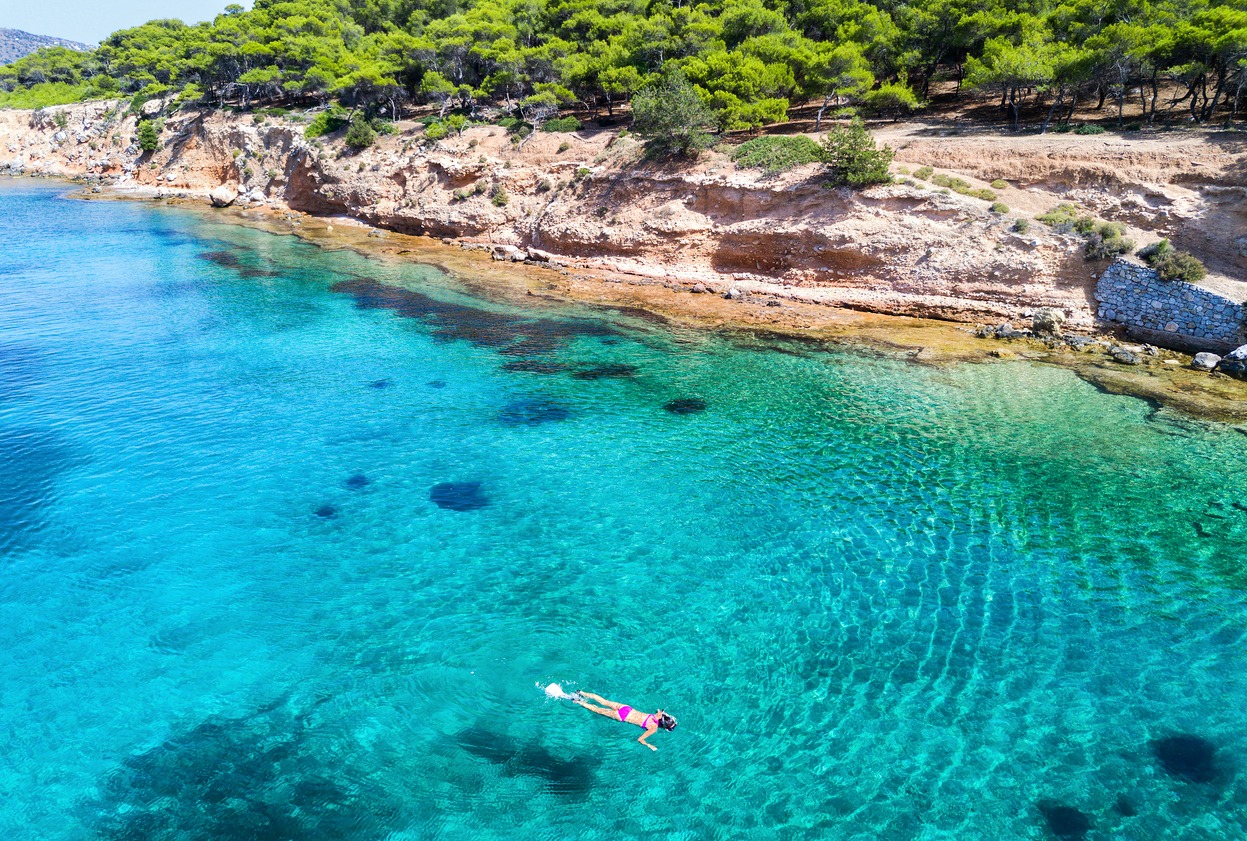
Greece offers incredible snorkeling opportunities with crystal-clear waters and diverse marine life. You'll find top spots in the Athens Riviera, Ionian Islands, and Cyclades, where you can observe colorful fish, sea turtles, and even rare Mediterranean monk seals. For the best experience, visit between May and October when water temperatures are warm and visibility is excellent. Don't forget essential gear like a well-fitting mask, snorkel, and fins. Whether you choose guided tours or independent exploration, always prioritize safety by checking local conditions and respecting marine protected areas. Plunge into Greece's underwater world to uncover hidden treasures and unforgettable experiences.
Best Snorkeling Spots in Greece
Greece's snorkeling hotspots offer a diverse underwater immersion for enthusiasts. You'll find excellent opportunities scattered across the country's mainland and islands. Near Athens, the Riviera boasts decent spots at Lemos Cape, Megalo Kavouri, and Charakas Beach. For an exceptional experience, head to Cape Sounion. If you're looking to venture further, Nea Makri serves as a launching point for snorkeling trips to the Cape of Marathon and Schinias Bay area. The Greek islands are where snorkeling truly shines. In the Ionian Islands, Zakynthos is renowned for its loggerhead sea turtles. You can spot these magnificent creatures at Laganas Beach, Cameo Island, and Dafni Beach. The Cycladic Islands, including Santorini, Mykonos, Naxos, and Paros, offer stunning underwater vistas around rocky reefs, lagoons, and coves. Don't miss the Dodecanese Islands, where Rhodes and Thassos stand out. Popular spots like Anthony Quinn Bay, Kallithea Beach, and Aliki Beach provide unforgettable snorkeling experiences. Whether you're a beginner or an experienced snorkeler, Greece's crystal-clear waters and diverse marine life will leave you awe-struck.
Underwater Marine Life to Observe
Beneath the surface of Greece's crystal-clear waters, you'll plunge into an exuberant underwater world teeming with diverse marine life. As you snorkel, you'll encounter schools of colorful fish, graceful sea turtles, and if you're lucky, the elusive Mediterranean monk seal. Keep an eye out for endemic species like the Iolas blue butterfly fish, white-spotted blenny, and the rare Mediterranean parrotfish. Greece's snorkeling sites offer unique geological features, such as the Silfra Fissure in Iceland where tectonic plates meet.
Greece's underwater landscapes offer a variety of ecosystems to immerse in. You'll glide over lush seagrass meadows, home to numerous small creatures, and navigate rocky reefs bustling with invertebrates like sponges, sea urchins, and fan worms. These diverse habitats provide shelter for a wide array of marine life, from octopuses to loggerhead sea turtles.
While Greece's waters lack tropical coral reefs, they compensate with unique temperate species and fascinating behaviors to observe. You might spot a loggerhead turtle grazing on seagrass or an octopus camouflaging itself among the rocks. Submerged caves and shipwrecks add an extra layer of intrigue, offering glimpses into hidden marine communities. Each snorkeling excursion promises new revelations in Greece's rich underwater world.
Essential Snorkeling Gear and Equipment
To fully enjoy Greece's underwater wonders, you'll need the right gear. Start with a well-fitting mask, snorkel, and fins—these are indispensable for a comfortable and successful snorkeling experience. Don't forget to pack a wetsuit or rash guard to help regulate your body temperature in Greece's cooler waters. For added safety and energy conservation, consider bringing a buoyancy vest or life jacket.
Capture your underwater adventures with a waterproof camera or GoPro, allowing you to relive the stunning marine life and scenery long after your trip. Proper sun protection is critical, so pack a hat, sunscreen, and rash guard to prevent painful sunburns during surface intervals.
To make the most of your Greek snorkeling experience, remember these emotionally charged tips:
- Feel the freedom of gliding effortlessly through crystal-clear waters with your fins
- Immerse yourself in the silent underwater world, breathing easily through your snorkel
- Experience the thrill of capturing vibrant sea life with your waterproof camera
- Embrace the comfort and security of a well-fitted wetsuit or rash guard
With the right equipment, you'll be fully prepared to explore Greece's breathtaking underwater panoramas and create unforgettable memories.
Ideal Seasons for Greek Snorkeling
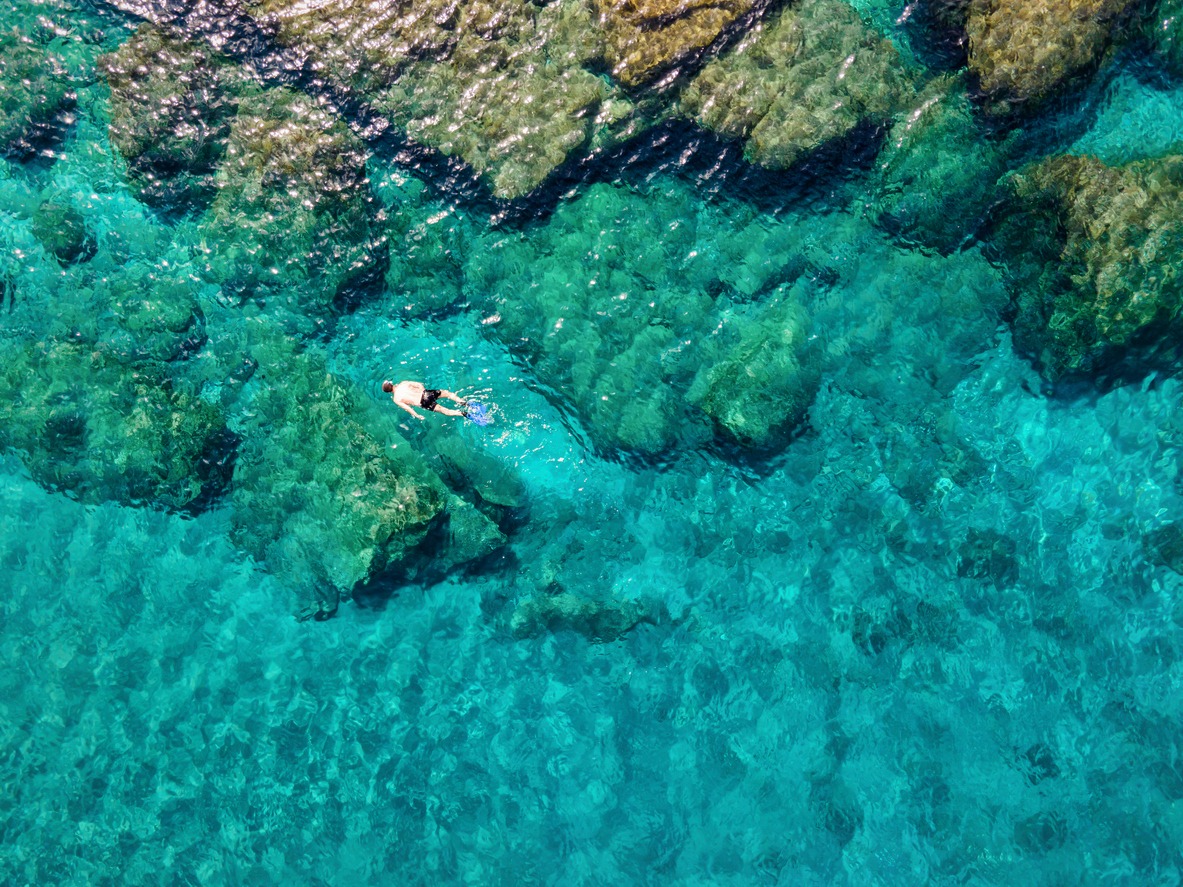
Typically, the ideal seasons for snorkeling in Greece span from May to October, when water temperatures are at their warmest and most inviting. During this period, you'll find average water temperatures ranging from 20-25°C, perfect for comfortable exploration of Greece's underwater wonders.
Summer months offer the best visibility, with underwater clarity reaching up to 30 meters. However, if you prefer fewer crowds, consider visiting during the shoulder seasons of spring (May-June) or fall (September-October). These periods still provide comfortable water temperatures between 18-22°C and excellent snorkeling conditions.
For wildlife enthusiasts, June to September is the optimal time to spot loggerhead turtles during their nesting season. You'll have a higher chance of encountering these magnificent creatures in their natural habitat.
While winter snorkeling is possible in southern regions like Crete, be prepared for cooler water temperatures dropping to 14-16°C. If you're planning a winter trip, make sure you have appropriate thermal protection to enjoy your underwater pursuits comfortably.
Safety Precautions and Guidelines
While enjoying the underwater wonders of Greece, your safety should always be a top priority. Before you plunge into the water, it's crucial to check local weather and sea conditions. Be especially cautious of strong currents, particularly near rocky outcroppings where water movement can be unpredictable.
Always wear appropriate snorkeling gear, including a life jacket, to guarantee your safety in the water. Familiarize yourself with the marine life in the area you'll be exploring, and avoid contact with potentially hazardous species. Remember to respect designated marine protected areas and follow all local regulations regarding snorkeling activities.
To make the most of your Greek snorkeling adventure while staying safe, keep these emotional reminders in mind:
- Your life is precious - don't take unnecessary risks.
- The beauty of marine life is best appreciated from a respectful distance.
- Your loved ones want you to return safely from your expedition.
- By following guidelines, you're protecting both yourself and fragile ecosystems.
Guided Tours vs. Independent Exploration
Snorkeling enthusiasts in Greece face a vital decision: opt for a guided tour or undertake an independent excursion. Guided tours offer a hassle-free experience, providing equipment, transportation, and knowledgeable guides who can show you the best spots and share perceptions about Greek marine life. You'll likely visit popular sites where you might encounter sea turtles or explore lively underwater ecosystems in crystal-clear blue waters.
On the other hand, independent exploration allows you to discover hidden gems and lesser-known bays on Greek islands. You'll have the freedom to snorkel at your own pace and potentially find secluded spots away from crowds. However, this approach requires more research and planning to guarantee safety and identify the best snorkeling opportunities.
Consider your experience level, budget, and preferences when making your choice. If you're a first-time snorkeler or prefer a structured experience, a guided tour might be your best bet. For those seeking adventure and flexibility, independent exploration could be more rewarding. Ultimately, whether you choose a guided tour or go it alone, Greece's stunning coastlines offer great snorkeling experiences for all.
Combining Snorkeling With Island Hopping
Greece's island-studded seas offer an unparalleled opportunity to combine snorkeling with island hopping. As you voyage from one Greek island to another, you'll uncover some of Europe's best snorkeling spots and incredible underwater landscapes. By sailing or taking ferries between islands, you'll gain access to remote coves and reefs that are often inaccessible from shore, allowing you to investigate the diverse marine life around the south Aegean.
Combining snorkeling with island hopping isn't just efficient; it's a way to create unforgettable memories.
- You'll uncover hidden gems away from crowded beaches.
- You'll witness the unique underwater ecosystems of each island.
- You'll experience the thrill of discovering secluded coves along rugged coastlines.
- You'll immerse yourself in both the natural beauty and rich culture of the Greek islands.
This combination allows you to maximize your time, surveying both above and below the water. You can seamlessly integrate snorkeling excursions with other activities like hiking, wine tasting, or visiting historical sites, creating a well-rounded Greek island experience that'll leave you breathless and wanting more.
Environmental Conservation While Snorkeling
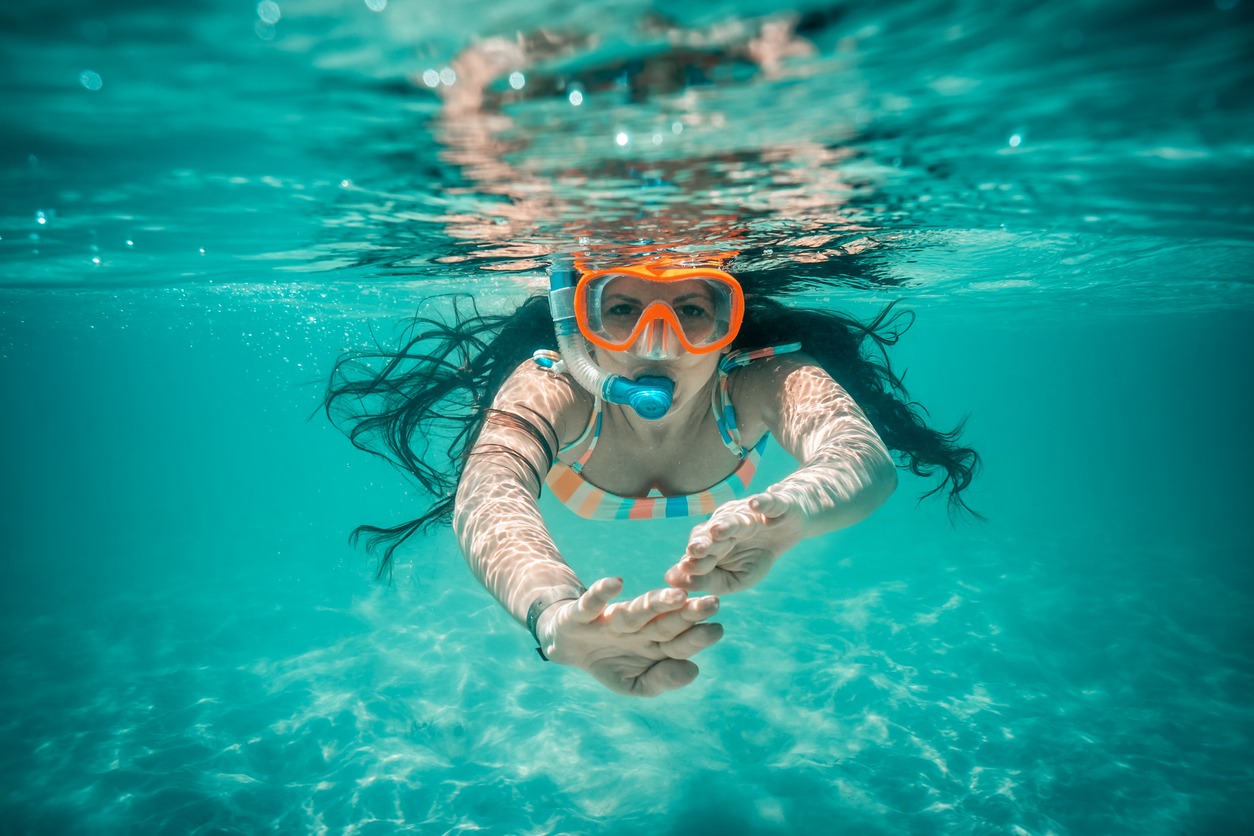
As you navigate through Greece's underwater marvels, it's crucial to remember that you're a guest in a delicate ecosystem. With over 100 protected areas and nature reserves, Greece's marine habitats are teeming with biodiversity that needs your help to thrive.
When snorkeling, resist the urge to touch or stand on coral reefs. These fragile structures can be easily damaged and take years to recover. Instead, observe marine life from a distance to minimize disturbance to sensitive habitats. Be aware of local regulations and guidelines, which may restrict access to certain zones or during specific seasons to protect vulnerable species like sea turtles.
Environmental conservation while snorkeling extends beyond what you do in the water. Practice sustainable behaviors by minimizing waste and using reef-safe sunscreen to prevent harmful chemicals from entering the ecosystem. Respect underwater life by not feeding or chasing marine animals, and avoid collecting souvenirs like shells or coral fragments.
Unique Greek Snorkeling Experiences
Plunge into a world of unique experiences as you investigate Greece's underwater treasures. From the Ionian to the Aegean islands, you'll encounter rare Mediterranean monk seals and loggerhead sea turtles in their natural habitats. Don't miss the mesmerizing Blue Cave in Kastellorizo, where glowing blue waters create an otherworldly atmosphere.
The Sporades and Ionian Islands offer lush underwater landscapes, featuring vibrant gorgonian gardens and vast seagrass meadows. You'll find these hidden gems in rocky coves and at popular spots like Kalamaki Beach, Gerakas Beach, and Galazio Beach. For a truly Greek experience, combine your snorkeling explorations with cultural exploration by immersing yourself near ancient shipwrecks and ruins along the coastline.
Unlike tropical destinations, Greek snorkeling provides a more tranquil experience. Here's what you can expect:
- Serene waters teeming with diverse marine life
- Fewer crowds, allowing for intimate encounters with nature
- Immersion in the local island lifestyle and culture
- A perfect blend of aquatic and historical exploration
Don't overlook lesser-known spots like Avlaki Beach, Ammoussa Beach, Agiofilli Beach, and Charakas Beach. For a truly unforgettable experience, visit Cape Sounion or Anthony Quinn Bay, where crystal-clear waters meet ancient history.

